Normalize U.S. Economy
U.S. stock prices have just reached record highs, erasing the losses since the previous 2007 peak. But the U.S. economy as measured by the labor-force participation rate, which captures the percentage of working-age people in the labor force, has just dropped to a new 34-year low of 63.3 percent. Since the Great Depression, recessions have always been followed by strong Read More ›

